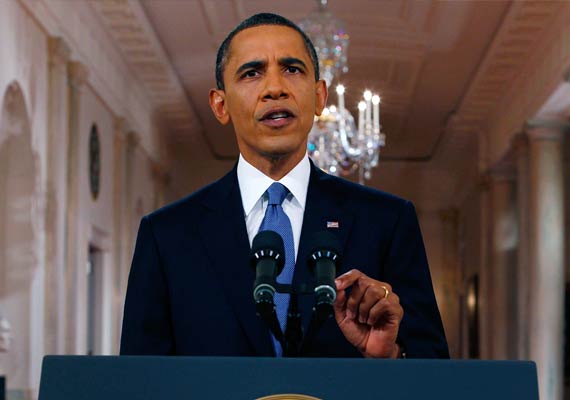Washington, Jun 23 : Lawmakers in President Barack Obama's Democratic Party are leading the criticism of his troop withdrawal plan from Afghanistan, arguing that the timeline for bringing 33,000 U.S. troops home by next summer isn't fast enough.
An initial drawdown of 10,000 troops is expected to take place in two phases, with 5,000 troops coming home within the next few months and 5,000 more by the end of the year. An additional 20,000-plus are to follow by September 2012.
Democrats said that wasn't adequate.
“It has been the hope of many in Congress and across the country that the full drawdown of U.S. forces would happen sooner than the president laid out—and we will continue to press for a better outcome,” said Democratic House Minority Leader Nancy Pelosi, leading a chorus of disgruntled Democrats who took the president to task, albeit politely.
However, John Kerry, the Democratic chairman of the Senate Foreign Relations Committee, said that Obama's plan will allow the Afghans to “begin to make the accommodations and the choices about their own future.”
Afghan President Hamid Karzai on Thursday backed up that argument, promising that his nation's youth will stand up and defend Afghanistan as the U.S. begins to pull its troops out. Karzai thanked international troops for their support and said “the people of Afghanistan will be protecting their homeland.”
The Republican response to Obama's timeline for withdrawing tens of thousands of troops was measured. Republican House Speaker John Boehner warned Obama not to sacrifice the gains the U.S. has made in Afghanistan, while Republican Sen. John McCain, Obama's rival in the 2008 presidential election, said the drawdown was too rash.
“This is not the ‘modest' withdrawal that I and others had hoped for and advocated,” McCain said in a statement following Obama's televised prime-time address to the country Wednesday night.
Potential Republican presidential candidates were quick to weigh in with criticism of Obama's plan.
Former Massachusetts Gov. Mitt Romney accused Obama of proposing an “arbitrary timetable” and said the decision on withdrawing troops “should not be based on politics or economics.”
However, Jon Huntsman, Obama's former ambassador to China, said the approach in Afghanistan should be focused on counterterrorism, “which requires significantly fewer boots on the ground than the president discussed tonight.”
As Obama works to sell his withdrawal plan, on Thursday he was to visit Fort Drum, the New York state Army post that is home to the 10th Mountain Division, one of the most frequently deployed divisions to Afghanistan.
Obama ordered more than 30,000 “surge” forces to Afghanistan in 2009 in order to rescue a flailing effort, and promised to start bringing them home in July of this year. In his speech Wednesday night, he declared: “The tide of war is receding.”
Even after the surge forces leave Afghanistan, 70,000 U.S. troops will remain in an unstable country, fighting in a war bound to see more Americans killed. Obama said they will leave at a steady pace, but the U.S. combat mission is not expected to end until December 2014 -- and even then, a sizable and enduring contingent may remain in a different role.
Obama's announcement from the White House came in a perilous political environment. Most Americans oppose the war in Afghanistan and are far more concerned about the teetering economic recovery at home.
At least 1,500 members of the U.S. military have died and 12,000 have been wounded since the war began in late 2001. The financial cost of the war has passed $440 billion and is on the rise, jumping to $120 billion a year. Those costs have risen in importance as a divided U.S. government struggles to contain its soaring debt.
Conceding the economic strain of waging war at a time of rising debt and fiscal constraint, Obama said it was time for America “to focus on nation-building here at home.” The president's chances for re-election rest largely on his ability to show faster job growth in a time of deepening economic pessimism.
The withdrawal is supported by the bold bottom-line claims of his security team: Afghanistan, training ground for the Sept. 11, 2001, attacks on the U.S., no longer is a launching pad for exporting terrorism and hasn't been for years. But that also could fuel arguments for even greater withdrawals by voters wondering what the point of the war is after all these years, especially since the face of the enemy—al-Qaida leader Osama bin Laden—was killed by American forces last month during a U.S. raid in Pakistan.
Yet the White House insists the U.S. must maintain a strong fighting force in Afghanistan for now to keep the country from slipping back into a terrorist haven.
Obama said Wednesday that materials recovered during the raid to get bin Laden showed that al-Qaida was under deep strain. He said bin Laden himself expressed concern that his organization would be unable to effectively replace senior leaders that had been killed.
The president declared, “We have put al-Qaida on a path to defeat, and we will not relent until the job is done.”
Even after the troops come home, the war will remain expanded on Obama's watch. He approved 21,000 additional troops for Afghanistan shortly after taking office in 2009, bringing the total number to 68,000. That means he is likely to face re-election with more troops in Afghanistan than when he took office, although he has also dramatically reduced the U.S. military presence in Iraq.
Military commanders favored a plan that would allow them to keep as many of the 30,000 surge troops in Afghanistan for as long as possible, ideally through the end of 2012. That timeline would have given them greater troop strength through two crucial fighting seasons. Obama overruled them. AP

